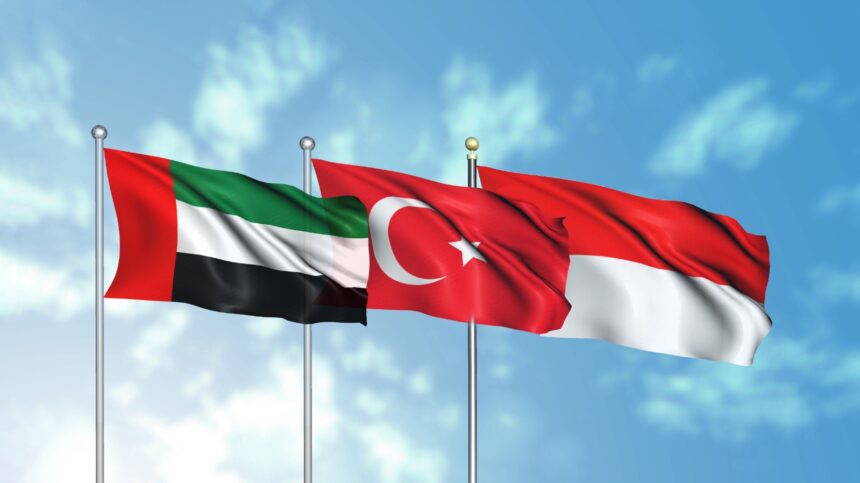UAE Comprehensive Economic Partnership Agreements (CEPA) with the Republic of Turkey and the Republic of Indonesia.
Comprehensive Economic Partnership Agreements, an important milestone.
They will open new markets and provide promising opportunities for UAE exports and investments in two of the world’s most important economic growth regions.
The start of the implementation of the agreements, with the flow of non-oil trade between the UAE and Turkey and Indonesia (individually), is an important milestone.
Because the two countries have increasing strategic importance on the international trade map.
Also they are a major gateway to the regional markets around them.
With the entry into force of the partnership with Turkey and Indonesia tomorrow, the number of CEPAs’ that are already being implemented rises to four.
After the partnership with India was implemented in early May 2022.
While the agreement with Israel came into force in early April 2023.
At the same time, the necessary arrangements are currently being finalized for the entry into force of more Comprehensive Economic Partnership Agreements.
His Excellency Dr. Thani bin Ahmed Al Zeyoudi, Minister of State for Foreign Trade, said:
“The start of the implementation of the UAE Comprehensive Economic Partnership Agreements with Turkey and Indonesia (individually) is an important milestone in the state’s plans.
In order to expand the network of trading partners with markets that have strategic importance regionally and globally.
He explained that the agreements will open up promising horizons.
As well as new markets for UAE exports and investments in two of the world’s most important economic growth regions.
Joint growth with two of the fastest growing trading partners of the UAE.
“The agreements with Turkey and Indonesia will work to strengthen the partnership.
As well as the joint growth with two of the fastest growing trading partners of the UAE.
Both agreements will stimulate and facilitate the flow of non-oil trade between the two countries.
Also they will secure supply chains, and provide opportunities to build partnerships with the business communities.
In order to achieve expansion, growth, and economic prosperity together.
In addition, they aim to stimulate the flow of capital to promising sectors such as:
Energy, logistics, tourism, Islamic economy, agriculture, and others.
He affirmed that the successive entry into force of the CEPAs’ that the state has concluded contributes to achieving the national targets.
Which aims at doubling the UAE’s non-oil foreign trade to reach 4 trillion dirhams.
As well as doubling national exports to 800 billion dirhams, according to the “We are the UAE 2031” vision.
He pointed out that the implemented agreements offer promising opportunities for UAE exports in markets with large populations and high consumption.
Al Zeyoudi expects that the positive impact of CEPAs will continue to appear in the unprecedented historical levels.
The Comprehensive Economic Partnership Agreement between the UAE and Indonesia aims at multiplying bilateral trade several times.
To reach more than $10 billion in five years, through the reduction or removal of customs duties on a wide range of goods and services.
Under this agreement, more than 80% of UAE exports to Indonesia will grant immediate exemption from customs duties.
Also the total value of trade in services between the two countries will increase to $630 million by 2030.
This agreement facilitates digital trade and opens up promising horizons.
for the UAE business community to conduct business with the largest economy in Southeast Asia.
The UAE-Indonesia economic partnership also aims to create more opportunities in the rapidly growing Islamic economy sector.
Which is estimated to reach $3.2 trillion by 2024. Indonesia is the world’s largest Islamic economy.
At the same time, the agreement will accelerate the pace of investment projects worth more than $10 billion.
CEPA between UAE and Turkey.
As for the Comprehensive Economic Partnership Agreement between the UAE and Turkey.
It aims to achieve mutual benefit for both parties.
As well as stimulate long-term, sustainable, and inclusive economic growth in the two countries.
The agreement eliminates or reduces customs duties on 82% of goods and products.
Which represent more than 93% of the components of non-oil trade.
It improves access to the Turkish market for UAE exports.
Including major sectors such as construction, metals and their products, polymers, and other manufactured products.
Read More:
UAE & Turkey: New Horizons For Sustainable Economic Growth
The UAE and India: A New Chapter In The Relationship.
The UAE and Qatar announced the reopening of their embassies.
UAE attracted 57% of (FDI) Foreign Direct Investment Projects.





